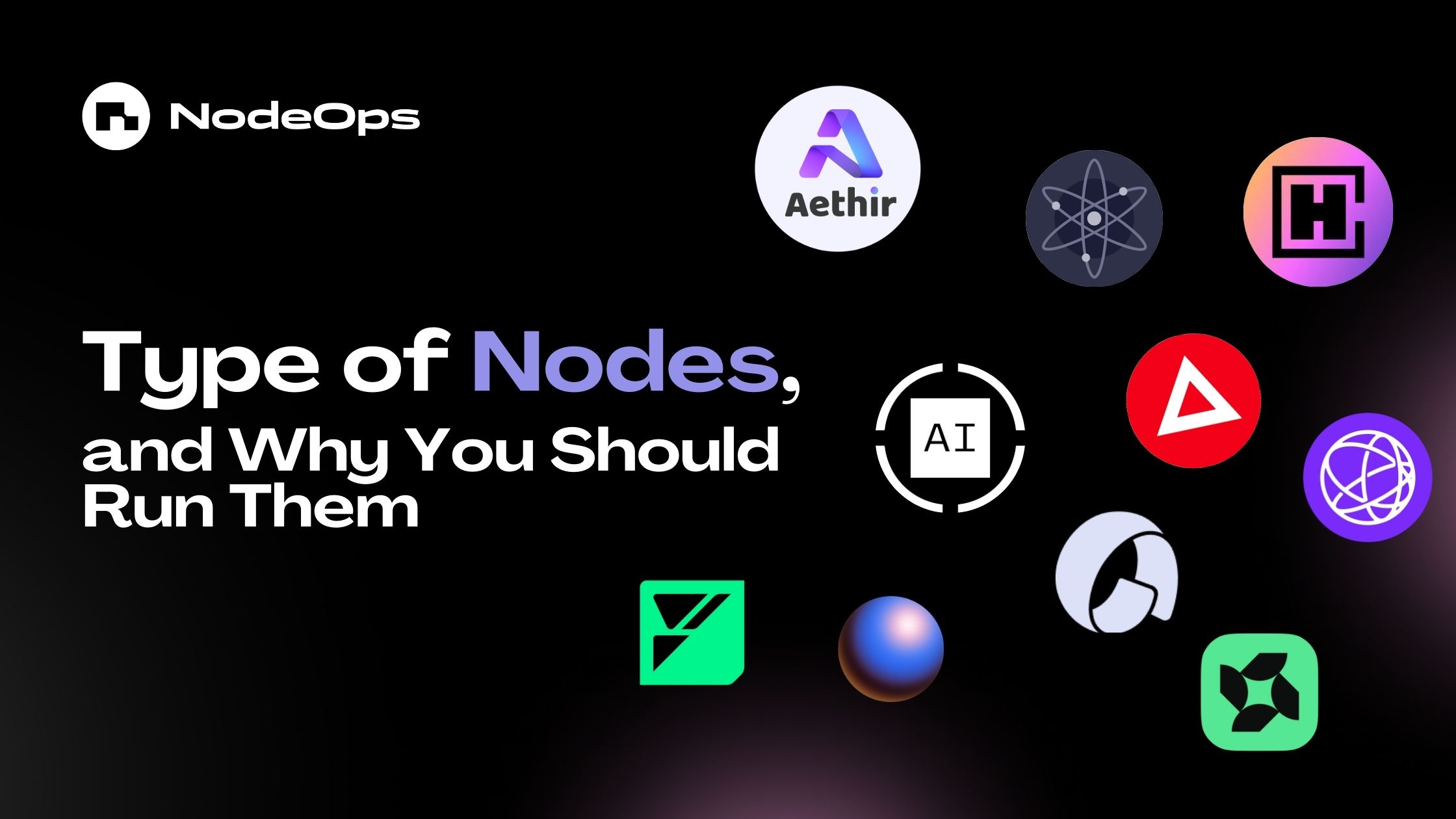Thanks for reading NodeOps! Subscribe for free to receive new posts and support my work.
Nodes are, in many ways, the beating hearts of blockchains - they are devices that run a blockchain network. A network of multiple nodes can form a distributed ledger, which is what we call a blockchain.
Each one of these nodes maintains consensus in a blockchain network, which can vary depending on the type of node. While nodes can broadcast and confirm information from other nodes in a blockchain, they can also validate network transactions.
NodeOps helps developers and node operators through one-click node deployment and infrastructure support. In the next sections, we will explain the kind of nodes NodeOps supports and why each one is important.
What does NodeOps do?
Before we get into the various types of nodes you can deploy in NodeOps, let’s explain what we do.
NodeOps is embarking on a journey to completely transform node operations through various solutions for developers and node operators. The NodeOps Console offers a one-click node deployment feature, which is our hallmark as a node-as-a-service provider.
NodeOps is one of the first AI playground dApps to offer a fully integrated lite playground. The feature allows users to query anything related to the protocol and text code snippets using “Try It” feature for quick experimentation and testing.
Apart from complete node management and maintenance, our infrastructure support for developers helps them build dApps seamlessly, as we handle all the technical aspects!
Which Nodes can you deploy on NodeOps?
Since NodeOps has partnered with a list of prominent blockchain networks, here is a list of nodes of some of these networks you can deploy on our console:
Aethir Checker Nodes: The Aethir network is a GPU-as-a-service provider with solutions that are focused on AI. Its cloud computing infrastructure caters to those in gaming and AI to scale with the help of a decentralized framework. Aethir’s Checker Nodes, on the other hand, can be deployed using NodeOps.
Source: Checker Node deployment on NodeOps console
An Aethir Checker Node is one of the three components of the network, along with Indexers and Containers. These checker nodes are necessary for containers to function smoothly in the Aethir network. They verify the specifications of the containers according to Container Providers.
HYCHAIN Guardian Nodes: Hychain is a blockchain gaming protocol that simplifies web3 gaming by overcoming major challenges in the industry. The ecosystem’s guardian nodes act as supervisors for the activities in the network, maintaining its accuracy and strength.
The guardian nodes also ensure the presence of stability in the network by solving any errors and with constant monitoring. NodeOps acts as a major infrastructure partner for HYCHAIN, and using NodeOps to run HYCHAIN guardian nodes has several benefits!
Source: Guardian Node deployment on NodeOps console
Cosmos Ecosystem Validator Nodes: Cosmos is a Layer 0 blockchain network that brings together and houses other Layer 1 blockchains. The validator nodes, light nodes, and sentry nodes can run on the Cosmos ecosystem.
NodeOps and its one-click node deployment feature help run Cosmos validator nodes. These nodes are essential since they propose new blocks and also vote on their approvals, while taking part in governance decisions as well. Since Cosmos bridges solutions to issues in web3, such as scalability and interoperability, NodeOps’s contribution to this ecosystem is of utmost importance.
XAI Sentry Nodes: Sentry nodes act as observers in the XAI chain, and raises alarms in case of inconsistencies like incorrect blocks. Node operators running these nodes also receive token rewards from the network.
Source: SentryNode deployment on NodeOps console
These sentry nodes can be deployed using NodeOps.
Oraichain Validator Nodes: Oraichain is a data oracle platform that leverages smart contracts to connect artificial intelligence APIs. It effectively helps integrate AI APIs and smart contracts, which is an innovation in the world of blockchains.
NodeOps is an active partner of this innovative blockchain by enabling the one-click deployment of its validator nodes.
Celestia Light Nodes: The Celestia network offers Ethereum rollup frameworks that can help create your own blockchain. It makes deployment of blockchains as easy as a smart contract!
Light nodes in the network are the gateway to retrieving and verifying data.
Zora Nodes: The Zora blockchain network deals with decentralizing media and culture. The Layer 2 network’s nodes allow you to become active members of this ecosystem.
Once you purchase these nodes, you can run them with NodeOps!
Avail Validator Nodes: Avail offers solutions to data availability and helps verify it efficiently through sampling in a peer-to-peer network. The blockchain’s validator nodes can be deployed effortlessly on NodeOps.
Powerloom Snapshotter Lite Nodes: Applications that run on smart contracts have a growing demand for data requirements. This is where the Powerloom network comes in as a data protocol. Its Snapshotter nodes store data from the network, and these nodes are incentivized with Powerloom tokens.
Source: Snapshotter Litenode deployment on NodeOps console
If you’re willing to deploy these Snapshotter nodes, NodeOps will be more than happy to help.
Fuel Node: The Fuel blockchain network helps build Ethereum Layer 2 blockchains by acting as an operating system for developers. The network’s nodes are available on NodeOps for deployment.
As we explained, becoming a node operator allows you to be an important stakeholder in a blockchain network. Running these nodes could often become cumbersome, and this is where NodeOps could help you!
NodeOps is the only node operator supporting almost all of the recent node infrastructures that raised more than 125 million via their Node Sales, with over 17,000 nodes powered by us in the last quarter alone. We currently support over 20 chains and are actively expanding our reach in the coming weeks. Follow us on X to stay tuned for updates!
Join us today and explore our one-click node deployment feature across our partner protocols!


